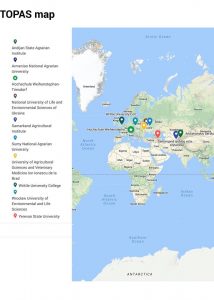Project title:
“From Theoretical-Oriented to Practical Education in Agrarian Studies” (TOPAS)
585603-EPP-1-2017-1-DE-EPPKA2-CBHE-JP
Duration: 36 months (2017-2020)
Grant: 977.963 €
Coordinator: Ralf Schlauderer
HOCHSCHULE WEIHENSTEPHAN-TRIESDORF – Germany
Prof. Prof. h. c. mult. (KazATU,KNIEU,VSAU,BSAA,MNAU) Dr Dr h. c. mult. (SNAU, ANAU)
Contact: +499826654101
e-mail: ralf.schlauderer@hswt.de
TOPAS is a European project co-funded by the EU program “Erasmus +” that involves ten partners in six European countries: Germany, Great Britain, Romania, Poland, Armenia, Ukraine and Uzbekistan.
The main goal of the project is to facilitate the transition from teacher centered knowledge-based form of education to student-centered practice based education in Agriculture studies – and hence employability – in Uzbekistan, Ukraine and Armenia by enhancing the cooperation university-agrarian enterprises through adequate internship schemes.
Armenia, Ukraine and Uzbekistan have shared a common historical background. Since their independence in the 90s, agriculture has undergone a period of transformation. The social, economic and political changes have had an impact on the entire higher education system. TOPAS aims at filling the gap within a common former soviet inherited agricultural sciences higher education system in these countries and practical training in real working environment to provide a better match between job market needs and the qualifications offered. The vocationally oriented practical programs should be introduced and improved based on learning outcomes and competencies approach with flexible learning pathways and permeability among the different agrarian management programs. Within the program partnership between universities and stakeholders (farm industry and associations) will be fostered.
A wide-range of activities will facilitate the transition from teacher centered knowledge-based form of education to student-centered practice based education in Agrarian studies and hence employability by enhancing the cooperation between universities and agriculture enterprises through adequate internship schemes with government support to recognize formal and informal learning and endorse ECQIP.
Another innovative aspect of the project is the creation of a databank for applied sciences on the field of agriculture management for teaching purposes in the field of data collection of students, teachers and researchers. This databank will consist of data on production inputs, costs and outputs of major cash crops of these countries and will offer valid data for agricultural management study courses. The experience of the last decade showed, that missing practical orientation and knowledge of BA and MA students is one of the most important obstacles for professional qualification. While curricula development was well adapted in many fields, the cooperation with farms and industry has to be built up.
By developing tools and paths for improvement of practical skills of graduates and fostering better links with agribusiness, the project will enhance employability and thus contribute to the improvement of the livelihood of the local population through intensification of private farming based on (ecologically, economically and socially) sustainable land and water resources.



